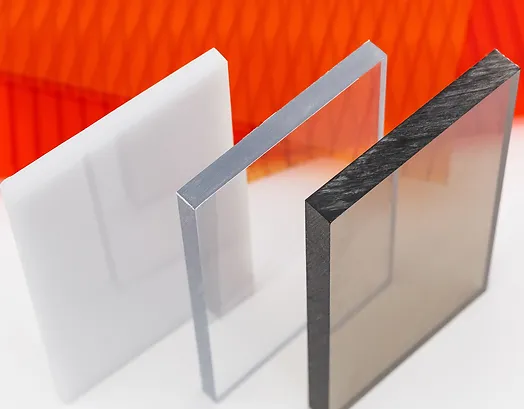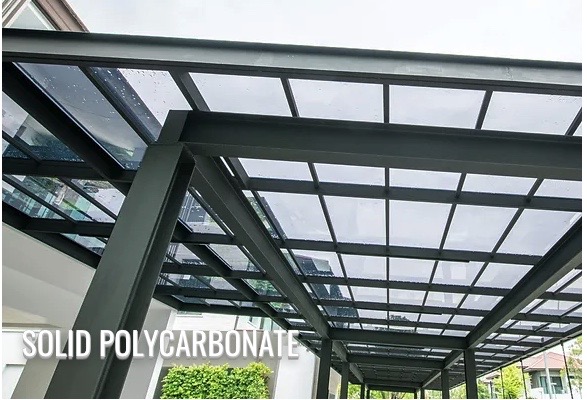 In construction, selecting the right glazing material is crucial for windows, skylights, and other architectural features. These materials should provide both aesthetic appeal and functionality. Glass is traditionally the preferred choice for glazing. However, polycarbonate Lexan sheets are becoming a popular modern alternative due to their unique properties, potentially offering advantages over traditional glass for certain uses.
In construction, selecting the right glazing material is crucial for windows, skylights, and other architectural features. These materials should provide both aesthetic appeal and functionality. Glass is traditionally the preferred choice for glazing. However, polycarbonate Lexan sheets are becoming a popular modern alternative due to their unique properties, potentially offering advantages over traditional glass for certain uses.
This guide examines the benefits of polycarbonate Lexan sheets vs. traditional glass to aid in making an informed choice.
Key Properties of Polycarbonate Lexan Sheets
High-Impact Strength
Polycarbonate Lexan sheets are extremely impact-resistant, about 250 times stronger than glass, providing excellent protection against breakage and vandalism. This makes them ideal for areas prone to severe weather or damage.
Lightweight
These sheets are strong yet lightweight, making them easier and quicker to install than traditional glass. This reduces labour costs, installation time, and stress on supporting structures, potentially extending the building’s lifespan.
UV and Weather Resistance
Polycarbonate Lexan sheets have excellent UV resistance, ensuring that they don’t discolour or degrade when exposed to sunlight. Therefore, they’re a perfect choice for outdoor applications where longevity and aesthetic appearance are crucial.
Sound and Thermal Insulation
Lexan sheets provide better sound insulation than glass, making them suitable for environments where noise reduction is important. They also offer superior thermal insulation, which can help reduce energy consumption by maintaining indoor temperatures more effectively.
Traditional Glazing Materials
While polycarbonate Lexan sheets for glazing offer numerous advantages, traditional materials like glass and acrylic remain popular for various reasons.
Glass
Glass is the classic choice for glazing. It’s valued for its transparency and aesthetic appeal. Types of glass used in construction include float glass, tempered glass, and laminated glass. While glass is durable, it is heavy and can be prone to breakage. These limitations can make it less suitable for certain applications compared to Lexan.
Acrylic
Acrylic is another glazing option that offers some of the impact resistance benefits of Lexan. It’s lightweight and can be used in various applications. However, acrylic can soften at high temperatures and may not offer the same level of durability as polycarbonate Lexan sheets.
Comparison of Properties
- Impact Resistance: Lexan sheets are significantly more impact-resistant than glass and acrylic making them ideal for safety applications.
- Weight: Lexan sheets are lighter than glass, making them easier to handle and install. This can lead to lower costs and faster project completion times.
- Thermal Insulation: Lexan sheets can provide better thermal insulation than glass, reducing energy consumption.
- Sound Insulation: Lexan sheets can offer improved sound insulation compared to glass, making them suitable for noise-sensitive environments.
- UV Resistance: Lexan sheets are highly UV-resistant, protecting against fading and degradation.
Applications of Polycarbonate Lexan Sheets
- Construction: In construction, Lexan sheets are frequently used for skylights, windows, canopies, and enclosures. Their strength and durability make them ideal for these applications.
- Automotive: Polycarbonate Lexan sheets are used in automotive applications such as headlights, taillights, and sunroofs. Their lightweight nature contributes to vehicle efficiency and performance.
- Industrial: Lexan sheets are used in industrial settings for machine guards, noise barriers, and greenhouse panels, offering protection, sound reduction, and optimal plant growth with durability and transparency.
- Commercial: Commercially, they are used in stadium seating, retail displays, and architectural features due to their aesthetic appeal and durability.
Cost Considerations
The upfront cost of Lexan can be higher, but this investment pays off over time through reduced repair and replacement expenses.
Lexan’s durability translates into long-term cost efficiency, making it a financially wise choice for projects requiring longevity.
Environmental Impact
Lexan sheets can be recycled, reducing waste and environmental impact. This feature makes them an eco-friendly alternative to traditional materials.
Their superior thermal insulation contributes to energy efficiency by reducing heating and cooling needs, which is beneficial for both the environment and your energy bills.
Discover a New Standard in Glazing Solutions
Polycarbonate Lexan sheets offer a strong, safe, and energy-efficient alternative to traditional glazing materials like glass and acrylic. If you’re ready to achieve both high performance and sustainability in glazing, look no further than Canada Plastics and Belting Inc. We carry a wide selection of polycarbonate Lexan solid sheets in Toronto and the GTA. Contact us today to explore the possibilities!

